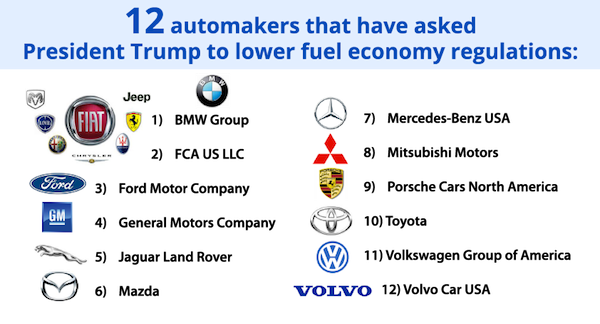This article was published in Scientific American’s former blog network and reflects the views of the author, not necessarily those of Scientific American
On February 21, 2017, automakers effectively undermined their own long-term viability by pushing for the loosening of critical fuel economy regulations. While the rest of the world is combating climate change, the U.S. is now backtracking on immense progress made towards staving off the worst effects of climate change, as well as on reductions in local air pollution, dollars saved, and making the auto industry more competitive. Instead, it has shortsightedly thrown this all out the window.
Even if more jobs were created in the short-term (the driving motivation supposedly), gas-guzzling cars that are uncompetitive have no future in the U.S. or abroad. Also, the U.S. has been here before, in 2007, when the automakers were bailed out for making inefficient vehicles that nobody wanted to buy. But the lessons of that era were not learned by anyone in power it seems, and worse, not by the automakers themselves. So when they ask for a bailout in the near future to save jobs, try, please, to remember this moment. This is nothing if not a self-inflicted wound.
While New York Times characterizes this fight as environmentalists versus everyone else, is that really the case? Are environmentalists really the only category of people who think this is a bad idea? Never mind that this regulation would save drivers $1.7 trillion in saved fuel costs over the lifetime of the vehicles. And never mind that 1.7 million children die each year from pollution (air and water), it is time to win again. But win what exactly?
On supporting science journalism
If you're enjoying this article, consider supporting our award-winning journalism by subscribing. By purchasing a subscription you are helping to ensure the future of impactful stories about the discoveries and ideas shaping our world today.
The basic argument by the automakers is that it is too arduous to meet the fuel economy standards of 54.5 miles per gallon (MPG) by 2025, compared with about 36 MPG today. The automakers claim it is not possible to hit that target. Is that true? Judge for yourself.

Besides a wider global lobbying group of automakers pushing for lowered fuel economy, here are the 12 companies of the that have asked President Trump to lower fuel economy regulations. Credit: Kathleen Sullivan
It is now time to put automakers in the same category with ExxonMobil; not just companies operating in a marketplace, trying to sell their product, but operators who are actively funding efforts to maximise their short-term profit margins at the very real expense of human health and habitat.
At least there is some hope: enter California to save the day.